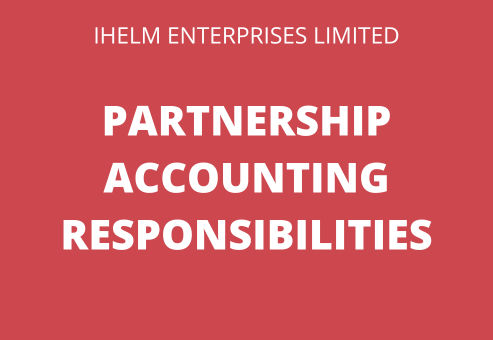During November’s Facebook Live, I talked about the responsibilities that partnerships in the UK have regarding their accounts.
In the dynamic world of business, partnerships are a common and versatile way for individuals or entities to collaborate and achieve shared objectives. In the United Kingdom, partnerships are a popular choice for many businesses, from small family enterprises to larger professional firms. However, with the benefits of partnership come responsibilities, particularly in the realm of accounting. In this blog post, we’ll explore the essential responsibilities that partnerships have regarding accounts in the UK.
1. Legal Structures of Partnerships in the UK
In the UK, there are several types of partnerships, each with distinct accounting responsibilities. The two most common forms of partnerships are:
– General Partnerships: These are the simplest form of partnership, where two or more individuals come together to run a business. In this structure, all partners share equal responsibility and liability for the business’s financial obligations.
– Limited Liability Partnerships (LLPs): LLPs offer a level of protection to partners’ personal assets, limiting their liability to the extent of their capital contributions. LLPs require more formalized accounting and reporting compared to general partnerships.
2. Registering a Partnership
The process of registering a partnership in the UK involves submitting the necessary documentation and information to Companies House, the official registrar of companies. All partnerships, regardless of type, must register and provide annual updates. This registration process includes disclosing important financial information.
3. Maintaining Proper Accounting Records
Partnerships in the UK are legally obligated to maintain accurate accounting records. These records must include a detailed account of all financial transactions, income, expenses, assets, and liabilities. Proper record-keeping is crucial for various purposes, such as tax compliance, financial reporting, and auditing.
4. Preparing Financial Statements
Partnerships are required to prepare annual financial statements, which should consist of a balance sheet, an income statement, and a statement of changes in equity. These statements provide an overview of the partnership’s financial health and performance during the fiscal year. The financial statements must be prepared in accordance with Generally Accepted Accounting Principles (GAAP) or International Financial Reporting Standards (IFRS).
5. Tax Compliance
Partnerships in the UK have specific tax obligations. They are considered transparent entities for tax purposes, meaning that the partnership itself does not pay taxes on its profits. Instead, the profits and losses flow through to the individual partners, who report and pay taxes on their respective shares. It is essential to comply with HM Revenue and Customs (HMRC) requirements, including filing annual partnership tax returns and providing partners with the necessary information to complete their personal tax returns.
6. Annual Filings
Partnerships in the UK are required to file annual financial statements with Companies House. These filings must be submitted within nine months of the partnership’s financial year-end. Failure to file these documents on time can result in financial penalties and damage to the partnership’s reputation.
7. Partner Contributions and Distributions
Partnerships must maintain clear records of partner contributions and distributions. This includes documenting capital contributions, profit-sharing agreements, and any drawings or distributions to partners. Transparent record-keeping is essential for accountability and avoiding disputes among partners.
8. Compliance with Regulations
Partnerships must comply with various regulations, including those related to financial reporting, tax, and business activities. Staying informed about changes in accounting and business regulations is crucial to ensure compliance.
Partnerships in the UK offer flexibility and shared responsibilities among partners, but they also entail significant accounting responsibilities. To navigate the financial waters successfully, partnerships must adhere to legal structures, maintain accurate records, prepare financial statements, ensure tax compliance, file annual documents, and keep partners informed about financial matters. Staying organized and compliant with regulations is key to the long-term success of any partnership in the UK. Consulting with financial experts or accountants can be invaluable in fulfilling these responsibilities and ensuring the financial health of the partnership.
If you have any questions about the responsibilities a partnership has regarding their accounts, please feel free to e-mail me.

